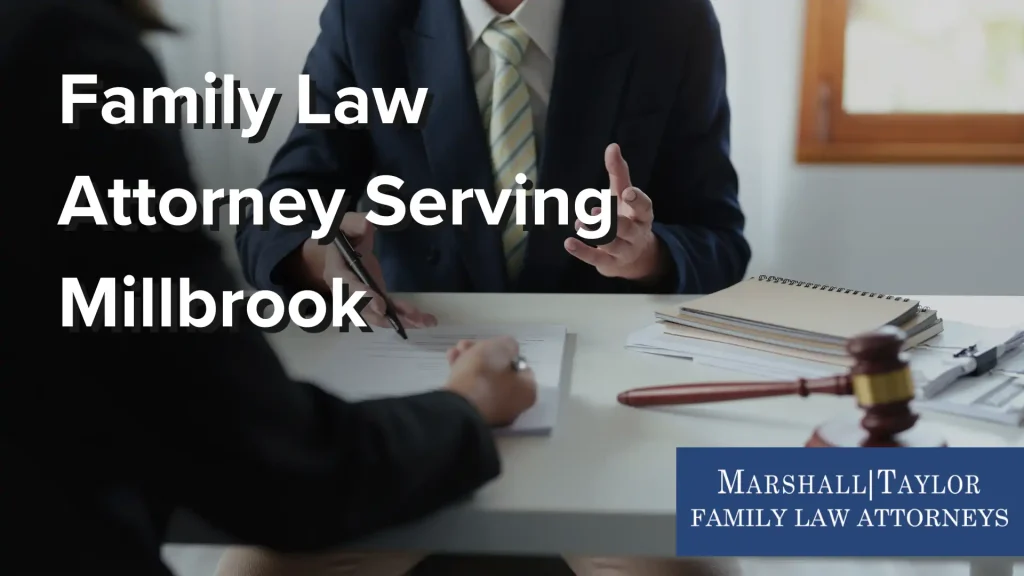
If you’re filing for divorce, pursuing adoption, or dealing with another family law issue, contact Marshall & Taylor PLLC immediately. We could represent you in your case to protect your rights and interests.
The decision to get a divorce is difficult for anyone to make. It can create various challenges and emotional turmoil. Ending a marriage could require a lengthy court process and negotiations about the terms of property division, child custody, and other matters. You could face disputes with your spouse that seem impossible to resolve.
At Marshall & Taylor PLLC, we understand the complicated battle ahead. Whether you face divorce proceedings, mediation, or a lawsuit, you can count on us to help. We will be your advocates and fight to meet your needs and try to resolve your case favorably. Our family law attorneys in Millbrook, NC, will provide the quality legal representation you need and deserve.
Call Marshall & Taylor PLLC today at (919) 833-1040 for your consultation or reach out to us online.
Cases We Handle
At Marshall & Taylor PLLC, we take family law cases that involve a range of circumstances, such as:
- Divorce
- Alimony
- Contested divorce
- Child support
- Mediated divorce
- Alternative dispute resolution
- Separation
- Adoption
- Uncontested divorce
- Child custody and visitation
- Property division
- Collaborative divorce
- Domestic violence and restraining orders
Differences Between Contested and Uncontested Divorce
You can file for one of two types of divorce in North Carolina – uncontested or contested.
Typically, an uncontested divorce is much easier to resolve than a contested one. That’s because the process stays amicable. Although the couple might disagree on some terms, they find a way to reach an agreement on most elements of their divorce so they can avoid unnecessary delays.
A contested divorce involves various disputes. Whether one or both have an issue with the child custody arrangement or can’t agree to the terms of property division, the disagreements create challenges.
Contested divorces often require litigation. Taking the case to court for a judge to decide on the various aspects of the divorce agreement is necessary. However, this can be problematic because neither spouse will have a say in how the judge rules.
Common Aspects of a North Carolina Divorce
North Carolina statute § 50-6 requires divorcing couples to meet these conditions before filing for divorce:
- Live separately and apart for at least one year
- At least one person in the divorce proceedings has resided in the state for six months or longer
In North Carolina, you can pursue a no-fault divorce. That means you don’t need grounds for dissolving the marriage. Even if neither party was to blame for the failure of the marriage, you could proceed with filing the petition.
Divorce involves various issues that you and your spouse must discuss. You need to include these terms in your agreement, so both of you understand your duties and obligations when the divorce is final.
Property Division
Dividing assets requires determining which are marital property and which are separate property. North Carolina is an equitable distribution state. That means the court will divide property based on what it considers to be equitable and fair.
It’s essential to understand that equitable doesn’t necessarily mean equal. Although you might think splitting everything down the middle is beneficial, it could cause negative consequences. That’s because property division doesn’t only involve splitting up assets. It also includes dividing shared debt.
 For example, if you and your spouse divide your marital debts equally but one of you makes significantly less income than the other, one person will be liable for debt they might not have the means to pay off.
For example, if you and your spouse divide your marital debts equally but one of you makes significantly less income than the other, one person will be liable for debt they might not have the means to pay off.
North Carolina law recognizes three types of property:
- Marital property – Marital property is all real and personal property either spouse acquires while married but before separating. The marital home, motor vehicles, and bank accounts are common types of marital property.
- Separate property – Separate property includes all personal and real property either spouse acquires before marriage or after the separation date. Anything either spouse acquires during the marriage as a gift or inheritance is also separate property.
- Divisible property – Divisible property is all real and personal property, including passive income from marital property after the separation date, passive increases and decreases in marital debt and interest and finance charges related to the debt, all appreciation and diminution of marital and divisible property value after separating but before the date of distribution, and all property, property rights, or any portion either spouse acquires due to their efforts while married and receives after separating but before distribution.
Child Custody and Support
North Carolina statutes § 50-13.1 to 50-13.9 give the courts guidelines for settling proceedings or actions involving child support and custody. The judge will rule according to what they believe will promote the child’s welfare and interests.
The parent who lives with the child is the custodial parent. The non-custodial parent doesn’t reside with the child.
In some cases, the court might order the non-custodial parent to provide the other parent with child support payments. The payments supply the children with basic needs, such as healthcare, food, and housing. Typically, child support orders remain effective until the child turns 18. However, special circumstances allow child support to continue beyond the child’s 18th birthday.
Alimony
Either spouse can file a petition for alimony during divorce proceedings. The court awards alimony to the dependent spouse only if it determines these factors apply:
- The petitioning spouse is the dependent spouse;
- The other spouse is the supporting spouse; and
- An alimony award is equitable after considering the relevant factors.
Judges can decide on the amount and duration of alimony payments based on state law and their discretion. The judge might consider these factors in making their determination:
- The marital conduct of both spouses
- Either person’s contributions to the other’s education, increased earning power, or training
- Each spouse’s age and physical, emotional, and mental condition
- The petitioning spouse’s relative education and the necessary time to complete education or training to find a job that satisfies their economic needs
- Each person’s relative needs
- The duration of the marriage
- Local, state, and federal tax consequences of awarding alimony
- The standard of living established by the couple during the marriage
- One person’s contributions as a homemaker
- The relative earnings and earning capacities of each spouse
- The extent that serving as a custodial parent to a minor child will affect financial obligations, expenses, and earning power
- The property each person brought to the marriage
- The relative liabilities and assets and relative debt service requirements of both parties
- The amount of earned and unearned income and the sources of income for each person, including dividends, earnings, and benefits, such as medical insurance or retirement plans
Contact Us
At Marshall & Taylor PLLC, our Millbrook family lawyers understand the toll divorce can take on a person’s life. It can be an emotional roller coaster ride, especially if disputes arise. We will be by your side during every step of the process to fight for your interests and future.
Whether you’re going through a divorce, pursuing a new child support arrangement, or dealing with any type of family law matter, call Marshall & Taylor PLLC at (919) 833-1040 today for a consultation.
